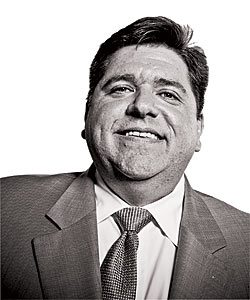Interview conducted and condensed by Jeff Bailey

You’re the only Pritzker of your generation to start businesses rather than run one of the established companies your uncles and your father, Donald, built. What made you strike out on your own, albeit with family resources behind you?
Well, the fact that my father set out on his own to build Hyatt, a business the family was not in, and a business he was learning about as he was building it, is instructive. Whatever you build, you’re building for the family—not with an eye toward getting away, but with an eye toward adding to the family pie.
How old were you when your father died?
I was seven. I’m the youngest of my generation [at 45]. None of our family businesses were focused on technology. It was ’93 when I came out of law school, and the Internet was taking hold. So I started New World Ventures.
The Forbes 400 makes delicious reading for those of us not in it. This past year’s list, in case you missed it, named you the 220th richest American, at $1.6 billion. Every person you meet thinks they know your net worth.
Forbes doesn’t ask. I don’t have any idea how they think they know.
Does that make it harder to be a tough negotiator—with people thinking your pockets are so deep?
Are you asking, does everybody expect a Pritzker premium? Over time you develop a reputation as someone who doesn’t overpay.
As opposed to being dumb money?
They’re going to be sorely disappointed.
Isn’t being a Midwest technology investor a bit of an oxymoron?
Not anymore. Today most of our deals are in Chicago. At first they weren’t. These things take time. We don’t have Cisco and Apple down the road. But, having said that, in Chicago we have talent and ideas. Take a look at Orbitz, Navteq, CoolSavings, FeedBurner, TicketsNow. These are all multibillion-dollar, or hundreds-of-millions, exits [sales]. And people who helped start those are starting new companies. We’ve been doing this for [14] years. Are there enough deals to do of a certain stature in the Chicago area? We feel there are.
You and your older brother Anthony, through Pritzker Group, also buy midsize industrial companies. The approach looks a little like Marmon, the conglomerate your uncle Bob ran that was ultimately sold to Warren Buffett’s Berkshire Hathaway.
Yeah. We’re flattered by the comparison. As you know, there is this transition going on in the family.
Right, the splitting up and distribution of billions of dollars of assets.
I can now engage in larger transactions, partnered with my brother. TicketsNow—when we got in, they were doing $140 million in revenue. By the time we sold to Ticketmaster, they were doing $400 million. We’re building a much larger investment program. For three years, prices were too high, but in the last two years we’ve been able to do more deals. We have six larger companies and are in the process of acquiring four more.
You bought Carter-Waters, a distributor of construction materials, in 2007, near the peak of deal prices.
They’re hurting. Commercial construction is diminished. Offsetting that is a lot of highway construction. But we’re cash-flow positive in all our businesses.
You ran unsuccessfully for Congress in 1998, losing out on your chance to be part of one of the least respected institutions in the country. Regrets?
My wife often reminds me. We’re out on a Saturday night, enjoying our lives, and she’ll stop and ask me, “What would you be doing right now if you’d won that seat in Congress?”
Photograph: Bob Stefko


